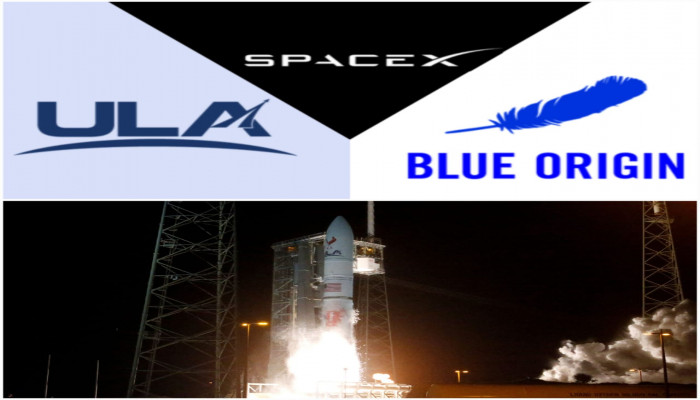SpaceX, Blue Origin, ULA win $13.5 billion U.S. Space Force satellite launch contracts
- In Reports
- 03:52 PM, Apr 05, 2025
- Myind Staff
On Friday, Elon Musk’s SpaceX, Jeff Bezos’ Blue Origin and United Launch Alliance (ULA) secured rocket launch contracts from the U.S. Space Force totalling $13.5 billion. Running through 2029, these contracts involve launching some of the Pentagon’s most critical and sensitive satellites. The launches fall under the Space Force’s key National Security Space Launch program, which will distribute about 54 missions through 2029 via individual task orders, per Space Systems Command.
SpaceX was awarded 28 missions, receiving $5.9 billion. ULA, a joint venture between Boeing and Lockheed Martin, got 19 missions for $5.3 billion. Blue Origin will handle seven missions later in the program, earning $2.3 billion. Reuters had previously reported that SpaceX and ULA were selected for these contracts.
This program is the most competitive and high-paying launch effort in the U.S., effectively confirming these companies as the top American rocket providers. While Blue Origin’s New Glenn rocket only had its first launch in January and still lacks the experience of SpaceX and ULA, it's now part of this elite group.
Using its Falcon 9 rocket, SpaceX is currently the busiest launch company in the world and has handled numerous military missions in recent years. For this program phase, SpaceX plans to use its regular Falcon 9 and the more powerful Falcon Heavy, which is comprised of three Falcon boosters. ULA’s new Vulcan rocket had its first two flights last year. After a detailed review of a solid rocket motor issue on one of those flights, the Pentagon recently approved Vulcan for national security launches.
These contracts fall under the “Lane 2” section of Phase 3, which covers the Pentagon’s most challenging and high-cost missions. These missions involve navigating complex orbits, and only the most experienced U.S. launch providers are allowed to compete for them.
According to sources familiar with the matter, SpaceX is expected to handle most of the missions the U.S. Space Force assigned in the program’s first year. The company’s Falcon 9 rocket has a much higher launch rate than competitors like ULA and Blue Origin. Elon Musk, SpaceX’s CEO, who also serves as an exceptional government employee and is known to be a close associate of former President Donald Trump, has had significant sway over the U.S. government. His influence has ranged from pushing for cuts in federal agencies to helping place allies in charge of departments that manage billions in government contracts with SpaceX.
The contracts awarded on Friday are part of a long-running process, marking the third phase of a program that dictates how the U.S. Defense Department secures launches for its military and intelligence satellites. Once controlled mainly by United Launch Alliance, a joint venture between Boeing and Lockheed Martin, this field is shifting toward newer players like SpaceX.
Over the last ten years, SpaceX has emerged as a significant force in the space launch industry. Its reusable Falcon 9 rockets have given it a competitive edge by significantly reducing costs, something its competitors have struggled to keep up with. This advantage has made SpaceX an essential partner for the Pentagon, which increasingly depends on the company for satellite-based military intelligence.
During the earlier Phase 2 of the national security launch program, SpaceX secured 40% of the missions, while ULA received 60%, with the total contract value exceeding $6 billion. However, some of ULA’s assigned missions had to be shifted to SpaceX due to delays in the development of ULA’s Vulcan rocket, which frustrated Pentagon officials.
“We are very pleased to be awarded 40 percent of the Phase 3 procurement,” Tory Bruno, ULA CEO, stated. “Vulcan is the right choice for critical national security space missions and is the only rocket today designed to meet all the requirements of our nation’s space launch needs.”
Although SpaceX came out as the clear champion in the program, Elon Musk still swiped at the company’s competitors on his social media platform, X.
“Winning 60% of the missions may sound generous, but the reality is that all SpaceX competitors combined cannot currently deliver the other 40%! I hope they succeed, but they aren’t there yet,” Mask expressed.







Comments